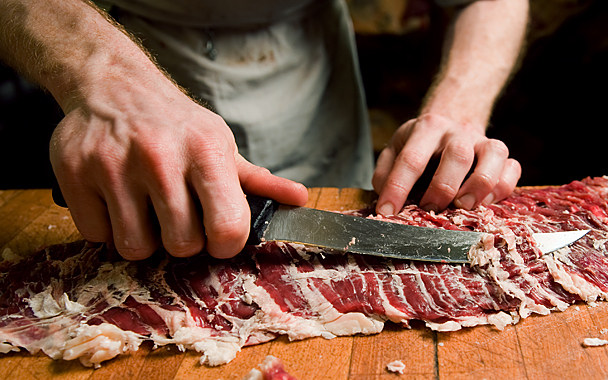When I met Josh six years ago, he was a vegan,” Jessica Applestone says of her husband, Josh Applestone, the co-owner of Fleisher’s butcher shop. A former vegetarian herself, she opened the shop with him a year later, after they were married. “He remained a vegetarian six months into business. What put him over the edge was bacon: It was his gateway meat.”
The Applestones haven’t so much gone to “the dark side,” as Josh calls it, as helped to build a bridge between two seemingly irreconcilable viewpoints. They share the same distrust of the meat industry that has inspired countless vegetarian lifestyles, and they understand why many conscientious eaters are intimidated by meat. They were, too. And that experience has enhanced their ability to educate customers at their Kingston, NY, store about what Josh calls “the cleanest” meat: the kind that comes from animals raised sustainably and humanely on small, local farms. “One vegetarian chef I know calls me the Moo-ru,” Josh jokes.
He isn’t as rare a breed as you might imagine: Across the country, butchers who were once vegetarians have become a small but driving force in reshaping the meat market. “It seems like not too long ago, to be a thoughtful eater meant being a vegetarian,” says Sasha Wizansky, one of the founders of Meatpaper, a San Francisco–based magazine devoted to, well, meat. “Now I think we’re experiencing a new movement of people who can stand behind the meat that they consume and support local farmers.” A vegetarian throughout her adolescence, Wizansky started eating meat again because she tired of “ruling things out” of her diet. Earlier this month, she was invited to UC Berkeley to sit on a panel about butchery. “They butchered a pig in the lecture hall,” she says. “People were so excited. At Berkeley, that would have been taboo only a decade ago.”
Across the bay in San Francisco’s Bernal Heights neighborhood, Melanie Eisemann preaches the gospel of local, sustainable meat at Avedano’s, the butcher shop she opened with two other women in 2007. Like the Applestones, Eisemann was a vegetarian for many years; she eventually resumed eating meat during a long illness. “I boycotted the meat industry as a vegetarian,” she says. “When we opened the butcher shop, I liked the idea of helping the meat industry change.”
Bev Eggleston shares that goal. He launched his company, EcoFriendly Foods, in 2001 to provide restaurants and consumers with meat grown humanely on small farms. Around the same time, Eggleston, who had been a vegetarian for more than a decade, resumed eating meat. The turning point was when he started producing it as a livestock farmer and felt able “to create a new reality of how animals were raised,” explains his wife, Janelle Eggleston. Bev designed his abattoir by getting down on his hands and knees to see it from an animal’s point of view.
To be sure, Eggleston, Eisemann, and the Applestones remain something of a novelty in their field, but their stories reflect a philosophical shift among the buying public. In an odd way, former vegetarians are the perfect leaders of the movement for sustainable, humanely raised meat: Years of saying “no” to meat have made them incredibly finicky about what merits a “yes.” Eating out with vegetarians can often entail discussion of what’s wrong with the meat industry; the new vanguard of former vegetarians is teaching us what can be right.



 Pinterest
Pinterest


